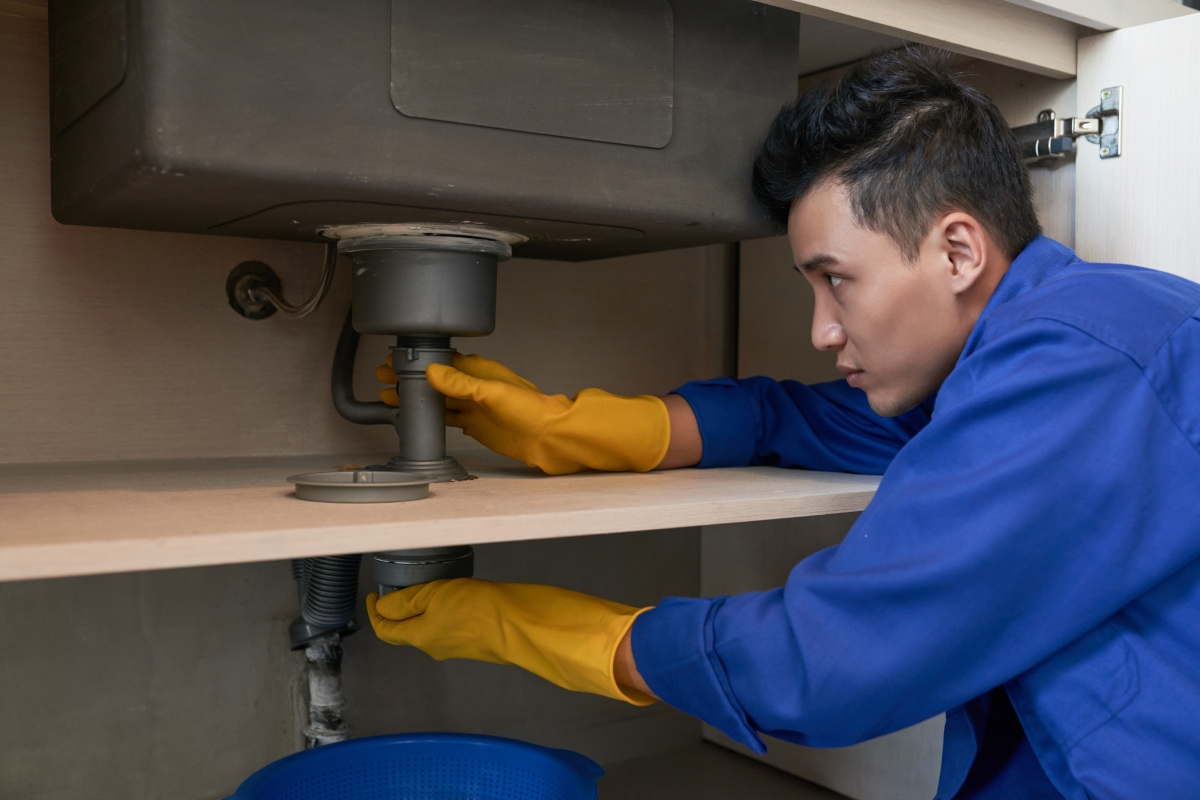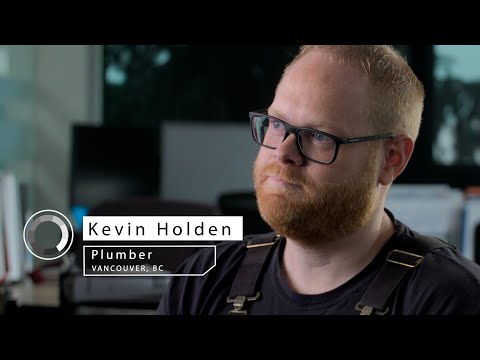Career Overview
Plumbers install, repair and maintain pipes, fixtures and other plumbing equipment used for water distribution and waste water disposal in residential, commercial and industrial building.
People in this occupation:
- Strictly follow the B.C. plumbing code
- Work in maintenance departments of factories, plants and similar establishments
- May work for plumbing contractors
- May be self-employed
- Must be able to accurately follow complex codes and rules for installation
- Must be able work without supervision and organize their own work day
- Should be able to bend and crawl into tight spaces
Job Titles
Duties
Plumbers perform some or all of the following duties:
- Read blueprints, drawings and specifications to determine layout of plumbing system, water supply network and waste and drainage systems
- Install, repair and maintain domestic, commercial or industrial plumbing fixtures and systems
- Locate and mark positions for pipe connections, passage holes and fixtures in walls and floors
- Cut opening in walls and floors to accommodate pipe and pipe fittings
- Measure, cut, bend and thread pipes using hand and power tools or machines
- Join pipes using couplings, clamps, screws, bolts, cement or soldering, brazing and welding equipment
- Test pipes for leaks using air and water pressure gauges
- May prepare cost estimates
Earnings
Earnings is income that workers receive in exchange for their labour. Depending on the type of employment, earnings can be in the form of wages (hourly), salaries (fixed monthly or annual) or self-employed earnings.
Work Environment
# Workers Employed
9,525% Employed Full Time
58%Plumbers typically work 40 hours per week. Some plumbers may also work on an on-call basis and respond to plumbing emergencies at all hours. Plumbers who do industrial maintenance at large facilities may do shift work.
The working environment for plumbers can be cramped, dirty and noisy, depending on the job. Plumbers must be physically fit since they are required to carry heavy pipe and stand for much of the day.
Heavy lifting and working in cramped spaces can lead to muscle and joint pain. Continued use of some tools may lead to repetitive stress injuries, such as tendonitis and bursitis.
Career Pathways
Most workers begin by working as apprentice plumbers. Upon completion of the apprenticeship program, workers receive their journeymen papers and are then certified plumbers.
Those who have completed their apprenticeships typically start out working for a larger plumbing contractor/company. Experience plumbers may be promoted to a supervisory position.
More experienced plumbers may choose to work as independent contractors and start their own plumbing companies. With additional education some plumbers may become certified plumbing inspectors.
Occupational Interests
It’s important to understand what kinds of occupations align with your interests.
For more about occupational interests visit Skills for the Future Workforce > Characteristics.
Here are the top occupational interest(s) for this career profile:
Education, Training and Skills
Completion of secondary school is typically required. Other requirements may include:
- Trade certification (Certificate of Qualification, Gas B License and/or Interprovincial Red Seal Endorsement) or apprentice status
- A combination of work experience and in-school training
- Completion of three six-week periods and one eight-week period, however, part-time and distance education is available through some institutions
Apprenticeships programs:
- May begin in secondary school, through entry-level training (foundation) programs at colleges and technical institutes or through direct entry to the workplace
- Require workers to find a sponsor employer willing to participate in the program
Plumbers are eligible for Interprovincial Standard Endorsement (Red Seal) qualification through SkilledTradesBC, which allows holders to work in any province or territory. Once plumbers pass the final examination of their accredited training program, they will achieve certification and will automatically receive Red Seal qualification.
Plumbers with 8,430 hours of documented, directly related work experience can challenge the Interprovincial Red Seal examination. For more information, please see SkilledTradesBC's website at https://skilledtradesbc.ca.
Plumbers who are certified for that occupation by a regulator elsewhere in Canada can apply for the same certification from the regulator in B.C. Under the terms of the Canadian Free Trade Agreement (CFTA), most applicants who are transferring their credentials from elsewhere in Canada will not be required to complete additional training or testing. However, the B.C. regulator may ask applicants to provide further information such as a letter of good standing, references, or criminal record check.
For those who trained outside of Canada and never received certification from any Canadian jurisdiction, a full assessment is likely needed. Most occupational regulators have a process for assessment and recognize internationally trained applicants.
Contact SkilledTradesBC for details on how to apply for certification in B.C.
For information about labour mobility in Canada, visit www.workersmobility.ca.
View a list of Professional Regulatory Authorities in B.C.
Visit our trades training page at www.workbc.ca/trades to learn about apprenticeship and trades training in B.C.
Education programs in B.C.
Top Skills
Every job calls for a certain set of skills. Knowing those skills is the first step in finding a good career fit.
Here, you will find the 10 most relevant workplace skills. Some are more important to achieving success in a certain career than others. These skills may come naturally to you or you may need to gain them through education, training and experience.
See the list of work-related skills below, ranked in order of importance for this career. Check out the list and see if this career matches your skills—take that first step!
Installing equipment, machines, wiring, or programs to meet specifications.
Using logic and reasoning to identify the strengths and weaknesses of alternative solutions, conclusions or approaches to problems.
Determining causes of operating errors and deciding what to do about it.
Keeping track of and assessing your performance, other individuals, or organizations to make improvements or take corrective action.
Considering the relative costs and benefits of potential actions to choose the most appropriate one.
Understanding written sentences and paragraphs in work-related documents.
Watching gauges, dials or other indicators to make sure that a machine is working properly.
Talking to others to share information effectively.
Conducting tests and inspections of products, services or processes to evaluate quality or performance.
Repairing machines or systems using the needed tools.
Labour Market Statistics
Discover data, facts and information that have been gathered and analyzed. Learn about the characteristics of the economy and labour market in B.C.
Employment
Find out about employment types and trends by region and industry.
Employment
9,525Employment by Region







| Region | Employment | % Employment of this Occupation |
|---|---|---|
| Cariboo | 260 | 2.7% |
| Kootenay | 280 | 2.9% |
| Mainland/Southwest | 6,080 | 63.8% |
| North Coast and Nechako | 140 | 1.5% |
| Northeast | 85 | 0.9% |
| Thompson-Okanagan | 1,245 | 13.1% |
| Vancouver Island/Coast | 1,435 | 15.1% |
Labour Market Outlook
The B.C. Labour Market Outlook is a 10-year forecast of the expected supply and demand for labour in the province. It’s usually updated every year. The purpose is to provide British Columbians with the knowledge to make informed decisions on careers, skills training, education and hiring.
Forecasted Job Openings (2025-2035)
2,900Forecasted Job Openings
Forecasted Employment Growth Rate
Composition of Job Openings
Job Openings by Region (2025-2035)







| Region | Job Openings | Avg. Annual Employment Growth |
|---|---|---|
| Cariboo | 80 | 0.7% |
| Kootenay | 20 | -1.4% |
| Mainland/Southwest | 1,900 | 1.4% |
| North Coast and Nechako | 40 | 0.6% |
| Northeast | 10 | -0.7% |
| Thompson-Okanagan | 440 | 0.7% |
| Vancouver Island/Coast | 410 | 0.8% |
Industry Highlights
Learn about the opportunities in B.C.'s major industries, including employment trends, earning potential, locations of work and more.
Forecasted Job Openings by Industry
| Industry | Job Openings (2025-2035) |
|---|---|
| Construction | 2,680 |
| Health Care and Social Assistance | 70 |
| Educational Services | 30 |
| Public Administration | 20 |
| Manufacturing | 20 |
Insights from Industry
Over the last few years low interest rates and a growing economy have resulted in a rapid increase in construction activity in B.C. Residential construction and renovations in the Lower Mainland, Fraser Valley, southern Vancouver Island and Okanagan regions continue to be a source of plumbing work.
Commercial, institutional and industrial construction will also continue to be an important job supply for plumbers.
Technological improvements and more efficient methods are increasing the productivity of plumbers. Improved output of workers will affect the number of new jobs created. For example, if construction activity increases in the future, there may not be an equal increase in the number of plumbing jobs.
Resources
-
Canadian Home Builders' Association of British Columbia (CHBA BC) - Continuing Educationeducation.chbabc.org/home.php
-
Canadian Institute of Plumbing & Heating (CIPH)www.ciph.com
-
Careers in Constructionwww.careersinconstruction.ca
-
Mechanical Contractors Association of British Columbia (MCABC)www.mcabc.org
-
Mechanical Contractors Association of Canada (MCAC)www.mcac.ca
-
Plumbing Officials’ Association of British Columbiaboabc.org
-
Plumbing-Heating-Cooling Contractors (PHCC) Associationwww.phccweb.org
-
Skilled Trades Employment Program (STEP)www.stepbc.ca
-
SkilledTradesBCskilledtradesbc.ca/
-
Trades Training BC – Jobs Boardjobs.tradestrainingbc.ca/
-
United Association: Union of Plumbers, Fitters, Welders, & Service Techs (UA)www.ua.org









